
வெள்ளை இனத்தவர்தான் எம்முடைய எதிரிகள், Olympic gold medal விடுதலையும் சமத்துவமும் கேட்டபோது எம்மை அவர்கள்தான் எதிர்த்தார்கள் என்று நேரிடையாகப் பேசியவர் அவர். 1960-களில் உலகத்திலேயே மிகவும் பிரபலமான நபர் என்ற பெருமை இவருக்கு உண்டு.
அவர் அமெரிக்காவைச் சேர்ந்தவர்தான். கென்டக்கி மாநிலத்தில் உள்ள லூயிஸ்விலி அவரது சொந்த ஊர். இளம் வயதிலேயே புறக்கணிப்பைச் சந்தித்ததாலும், தம்மைப் போன்றவர்கள் அடக்கு முறைக்கு ஆளாவதைக் கண்டதாலும் கலக மனநிலையிலேயே வளர்ந்தார். இன்று ஒலிம்பிக்கில் ஒரு பதக்கத்தையாவது பெற்றுவிடமாட்டோமா என பல நாடுகளும், ஏராளமான வீரர்களும் ஏங்கிக் கிடக்கிறார்கள். தனக்குக் கிடைத்த தங்கப் பதக்கத்தையே ஆற்றில் தூக்கி எறிந்தவர் முகமது அலி.
1960-களில் வியட்நாம் போருக்கு எதிராக கடுமையாகக் குரல் எழுப்பியதன் காரணமாக உலகம் முழுவதும் நட்சத்திர அந்தஸ்து பெற்றிருந்தார் முகமது அலி. அமெரிக்காவைவிட அவர்களுக்கு எதிராகச் சண்டையிட்ட வியட்நாமின் கம்யூனிஸ்டுகளே சமத்துவத்தை மதிப்பவர்கள் என்று கூறினார். குத்துச் சண்டைக் களத்துக்கு உள்ளே மட்டுமல்லாமல் வெளியிலும் தீப்பிழம்பாய் வெடிப்பவர் முகமது அலி. இவர் களத்தில் நிற்கிறார் என்றால் எதிராளிக்கு அச்சம் பிறக்கும். அவரது புள்ளிவிவரங்களிலேயே இது ஏன் என்பதைப் புரிந்து கொள்ளலாம். ஹெவிவெயிட் சாம்பியன்ஷிப்புக்காக மோதிய 61 போட்டிகளில் 56 முறை வென்றவர் முகமது அலி.
1960-ஆம் ஆண்டு ரோமில் நடந்த ஒலிம்பிக் போட்டியில் தங்கப் பதக்கம் வென்றபோது அவருக்கு வயது 18. வரலாற்றைப் புரட்டி ஒலிம்பிக் பதக்கப் பட்டியலில் அவரது பெயரைத் தேடினால் காண முடியாது. காரணம் அப்போது அவரது பெயர் கேசியஸ் கிளே. 1964-ஆம் ஆண்டு பிப்ரவரி 25-ஆம் தேதி மியாமியில் நடந்த சோன்னி லிஸ்டனுக்கு எதிரான போட்டியே முகமது அலிக்குப் பெரும் புகழைப் பெற்றுத் தந்தது. லிஸ்டன் அப்போதைய ஹெவிவெயிட் சாம்பியன். பல சாம்பியன்களை முதல் சுற்றிலேயே வீழ்த்தியவர். அவரது அபாரமான தாக்குதல் திறனுக்கு முன்னால் முகமது அலியால் தாக்குப் பிடிக்க முடியாது என்று பலரும் கருதியிருந்தனர்.
ஆனால் முகமது அலியின் திட்டம் துல்லியமானதாக இருந்தது. கண்ணால் பார்க்க முடியாவிட்டால், கைகளால் தாக்குதல் நடத்த முடியாது என்று போட்டிக்கு முன்பே முகமது அலி கூறியிருந்தார். சண்டையைப் பிரபலப்படுத்துவதற்காக முகமது அலி அளித்த பேட்டிகள் அனைத்திலும் லிஸ்டனை வசைபாடியிருந்தார். யாரோ ஒருவர் ஆடுகளத்திலேயே சாகப் போகிறார்கள் என்றும் கூறியிருந்தார். முகமது அலி கூறிய சொற்களால் கோபமுற்றிருந்த லிஸ்டன் மிக விரைவிலேயே அவரை வீழ்த்திவிடுவார் என்றும் கருதப்பட்டது.
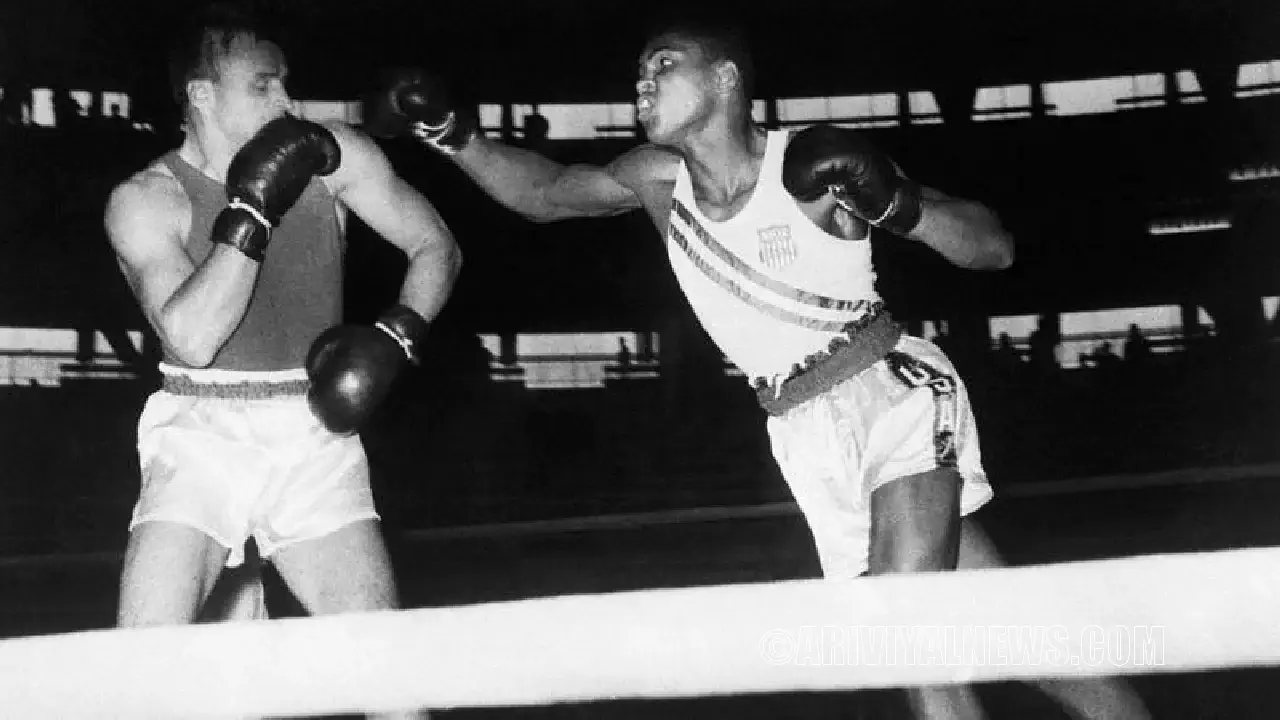
மியாமியில் போட்டி தொடங்குவதற்குச் சற்று முன்னதாக முகமது அலியின் இதயத்துடிப்பு 120ஆக இருந்தது. லிஸ்டனைக் கண்டு முகமது அலி அஞ்சியதாலேயே இதயத்துடிப்பு இரு மடங்காகி விட்டதாக பார்வையாளர்களும் நடுவர்களும் நினைத்தனர். அது உண்மையாகவும் இருந்திருக்கக்கூடும். ஆனால் சண்டையின் போக்கு வேறுமாதிரியாக இருந்தது. முதல் சுற்றில் இருந்தே லிஸ்டனைத் தனது கட்டுப்பாட்டில் வைத்திருந்தார் முகமது அலி. மூன்றாவது சுற்றில் முகமது விட்ட குத்தால் லிஸ்டனின் இடது கண்ணுக்கு அருகில் இருந்து ரத்தம் கொட்டியது. குத்துச் சண்டை வாழ்க்கையில் முதன் முறையாக தனது உடலில் இருந்து ரத்தம் வடிவதை லிஸ்டன் காண நேரிட்டது.
ஏழாவது சுற்று முடிவில் நாக் அவுட் முறையில் முகமது அலி வெற்றி பெற்று குத்துச் சண்டை உலகை அதிர்ச்சியில் ஆழ்த்தினார். அந்த வெற்றியைப் பெற்றபோது அவருக்கு வயது 22. இதன் மூலம் மிகக் குறைந்த வயதில் ஹெவி வெயிட் சாம்பியனிடம் இருந்து பட்டத்தைப் பறித்தவர் என்ற பெருமை முகமது அலிக்குக் கிடைத்தது. இந்தப் போட்டிக்குப் பிறகுதான் கேசியஸ் கிளே என்ற தனது பெயரை முகமது அலி என்று மாற்றிக் கொண்டு இஸ்லாம் மதத்தைத் தழுவினார். புகழ்பெற்ற கறுப்பினத் தலைவர் மால்கம் எக்ஸ் சார்ந்திருந்த நேஷன் ஆப் இஸ்லாம் என்ற அமைப்பில் இணைந்தார்.
அப்போது அமெரிக்காவில் கட்டாய ராணுவப் பணிச் சட்டம் அமலில் இருந்த காலம். வியட்நாம் போருக்காக ராணுவப் பணியில் சேருமாறு போடப்பட்ட உத்தரவை முகமது அலி நிராகரித்தார். இதனால் அவரது சாம்பியன் பட்டம் பறிக்கப்பட்டது. நியூயார்க் உள்ளிட்ட பல மாகாணங்களும் முகமது அலிக்குத் தடை விதித்தன. தேசத்துக்கு எதிரானவர் என்ற கருத்து பரப்பப்பட்டது. பாஸ்போர்ட் முடக்கப்பட்டது. ராணுவப் பணியை நிராகரித்ததற்காக அபராதமும் சிறைத்தண்டனையும் விதிக்கப்பட்டன. இருப்பினும் மேல்முறையீடு மூலம் தண்டனைகளில் இருந்து முகமது அலி தப்பினார். ஆனாலும், 1967 முதல் மூன்றாண்டுகளுக்கும் மேலாக அவரால் போட்டிகளில் பங்கேற்க முடியவில்லை.
இந்தக் காலகட்டத்தில் வியட்நாம் போருக்கு எதிராக கருத்துகளைப் பரப்புவதிலேயே முழு நேரத்தையும் செலவிட்டார் முகமது அலி. பொது இடங்கள், கல்லூரிகள், இளைஞர் அமைப்புகள் என பல தளங்களில் உரையாற்றினார். வியட்நாமில் அமெரிக்க ராணுவத்தினர் நடத்திய அத்துமீறல்கள் வெளிவரத் தொடங்கியதும் முகமது அலியின் கருத்துகளுக்கு மதிப்பு உருவானது. இதன் பிறகு அட்லாண்டாவும், நியூயார்க்கும் முகமது அலியின் குத்துச் சண்டை உரிமத்தை திருப்பியளித்தன. பெரும்பாலும் வெற்றிகளைப் பெற்ற முகமது அலிக்கு தோல்விகளும் உண்டு. தடைகளுக்குப் பிறகு குத்துச்சண்டை களத்துக்குத் திரும்பிய முகமது அலி, அப்போதைய ஹெவிவெயிட் சாம்பியனான ஜோ ஃப்ரேசியருடன் மோதினார். 1971-ஆம் ஆண்டு மார்ச் 8-ஆம் தேதி நடந்த இந்தப் போட்டி, முகமது அலி மோதிய மாபெரும் சண்டைகளுள் ஒன்று.
20-ம் நூற்றாண்டின் சண்டை என்று வர்ணிக்கப்பட்ட இந்தச் சண்டை, 35 நாடுகளில் தொலைக்காட்சி மூலம் ஒளிபரப்பப்பட்டது. இந்தப் போட்டியில் ஃப்ரேசியரின் குத்துகளுக்குத் தாக்குப்பிடிக்க முடியாமல் முகமது அலி வீழ்ந்தார். தொழில்முறை போட்டிகளில் யாராலும் தோற்கடிக்கப்படாதவரான முகமது அலிக்கு விழுந்த முதல் அடி இது. ஆனால், அதன் பிறகு இரண்டு முறை ஃப்ரேசியரை வீழ்த்தி ஹெவிவெயிட் சாம்பியன் பட்டத்தை முகமது அலி வென்றார்.
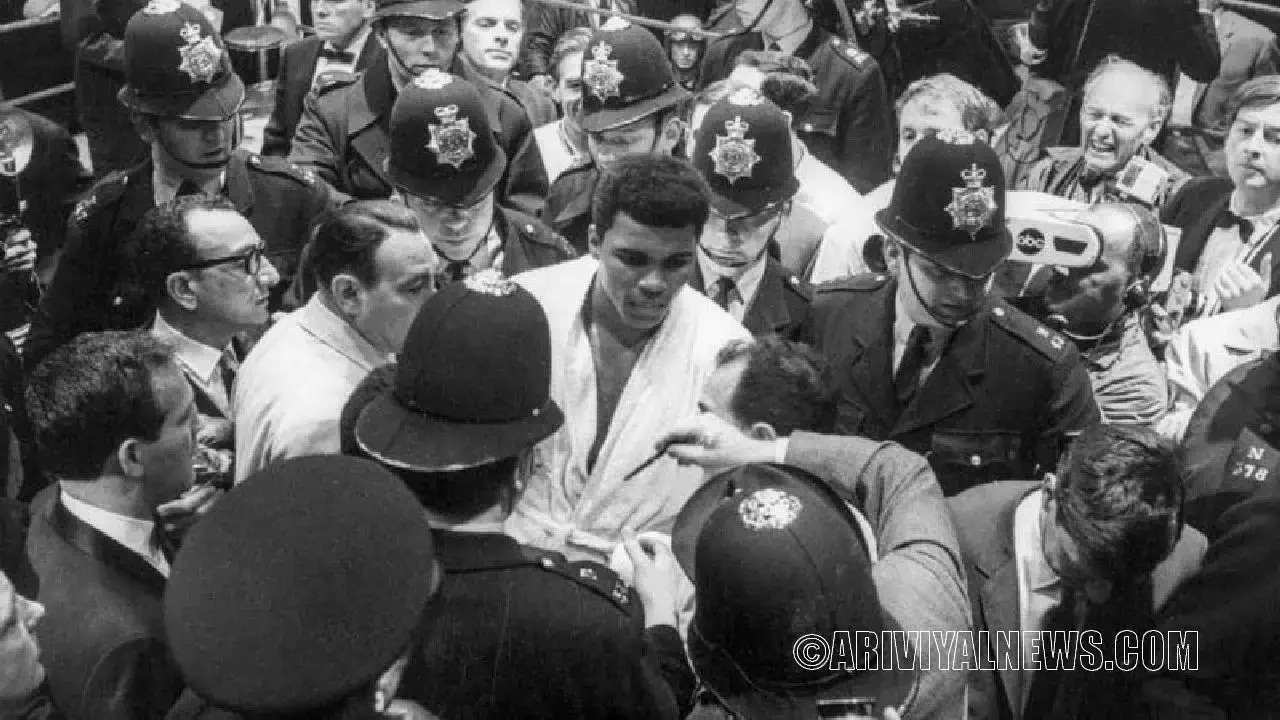
குத்துச் சண்டையில் வழக்கமான பாணி எதையும் பின்பற்றாதவர் முகமது அலி. தனக்கென சில உத்திகளை வகுத்து அதன்படியே கடைசிவரை சண்டையிட்டவர். கால்களை நகர்த்தும் விதமும், எதிர்பார்க்காத கோணத்தில் கைகளைக் கொண்டு செல்லும் முறையும் முகமது அலியின் குறிப்பிடத் தகுந்த திறன்கள். தாக்குவதற்கு ஏதுவாக முகத்தை வைத்திருப்பது போல ஏமாற்றி எதிரியை நிலை குலையச் செய்யும் வித்தையில் சாமர்த்தியமானவர். லிஸ்டன் போன்ற பல சாம்பியன்களை வீழ்த்துவதற்கு அவர் இந்தத் தந்திரத்தையே பயன்படுத்தியிருக்கிறார்.
தனது காலத்தைச் சேர்ந்த ஒவ்வொரு ஹெவி வெயிட் சாம்பியனையும் முகமது அலி வீழ்த்தியிருக்கிறார். அவர் களத்தில் சண்டையிட்ட காலம் ஹெவிவெயிட் குத்துச் சண்டை வரலாற்றின் பொற்காலம் என்றே கூறப்படுகிறது. குத்துச் சண்டை ஜாம்பவனான ஜோ லூயிஸுக்கு நிகராகக் போற்றப்படும் முகமது அலி, கறுப்பினத்தவரின் அடையாளமாகவும் மக்களின் மனம் கவர்ந்த மிகச் சில விளையாட்டு வீரர்களுள் ஒருவராகவும் இன்றுவரை அறியப்படுகிறார்.
இளம் வயதில் இருந்தே முகமது அலி கோபக்காரர். அதுவே அவரே வாழ்க்கை முழுவதும் நீடித்தது. 12 வயதாக இருந்தபோது மிதிவண்டி திருட்டுப் போனதால் ஏற்பட்ட கோபம்தான் அவரை குததுச் சண்டைக் களத்துக்கு இழுத்து வந்தது. அடுத்து ஆறாவது ஆண்டில் 1960 ரோம் ஒலிம்பிக்கில் அமெரிக்காவுக்காகக் களமிறங்கினார். அப்போது ஏதோ ஒரு சிறுவனாகத்தான் பலருக்கும் தெரியும். தொடக்க சுற்றிலேயே அனைவரும் அஞ்சும் வகையில் பெல்ஜியம் நாட்டு வீரரை குத்தி வீழ்த்தினார். அடுத்த சுற்றில் நடப்பு ஒலிம்பிக் சாம்பியனைத் தோற்கடித்தார். கடைசியாக வலிமையான போலந்து நாட்டு வீரரை வீழ்த்தி தங்கப் பதக்கத்தை வென்றார்.
அப்போதே அவர் அதைப் பெரிய பெருமையாகக் கருதிக் கொண்டதில்லை எனக் கூறப்படுகிறது. போட்டிகள் முடிந்து பிறகு அமெரிக்காவில் தனது சொந்த ஊரான லூயிஸ்விலிக்குத் திரும்பிவிட்டார். அப்போது ஒரு உணவகத்துக்குச் சென்ற அவர், அங்கு வெள்ளையர்களுககு மட்டுமே உணவு வழங்கப்படும் என்று கூறியதால் கோபமடைந்து சண்டையிட்டுள்ளார். அதனால் ஏற்பட்ட வெறுப்பிலும் கோபத்திலும் தங்கப் பதக்கத்தை ஒஹையோ ஆற்றில் வீசிவிட்டதாக 1975-ஆம் ஆண்டு வெளியான தனது சுயசரிதையில் முகமது அலி குறிப்பிட்டிருக்கிறார். “அதனால் வருத்தமோ வேதனையோ ஏற்படவில்லை. மாறாக நிம்மதியும், புதிய வலிமையும் கிடைத்தது” என்று தனது சுயசரிதையில் அவர் கூறியுள்ளார்.
இந்தக் குறிப்பிட்ட சம்பவத்தை பலர் ஏற்பதில்லை. தங்கப் பதக்கம் தொலைந்து போயிருக்கலாம் என்று கூறுகின்றனர். ஆனால் ஒலிம்பிக் கமிட்டி இந்தக் கதைகளை பெரிதாக ஆராயவில்லை. முகமது அலியைப் பெருமைப் படுத்தும் வகையில் 1996-ஆம் ஆண்டு அட்லாண்டா ஒலிம்பிக் போட்டிகளின்போது புதிய தங்கப் பதக்கத்தை வழங்கியது. அப்போது பார்க்கின்சன் நோயால் பாதிக்கப்பட்டிருந்த முகமது அலி “மிக்க நன்றி” என்று கூறினாராம்.
Why did Mohammed Ali throw the Olympic gold medal into the river?
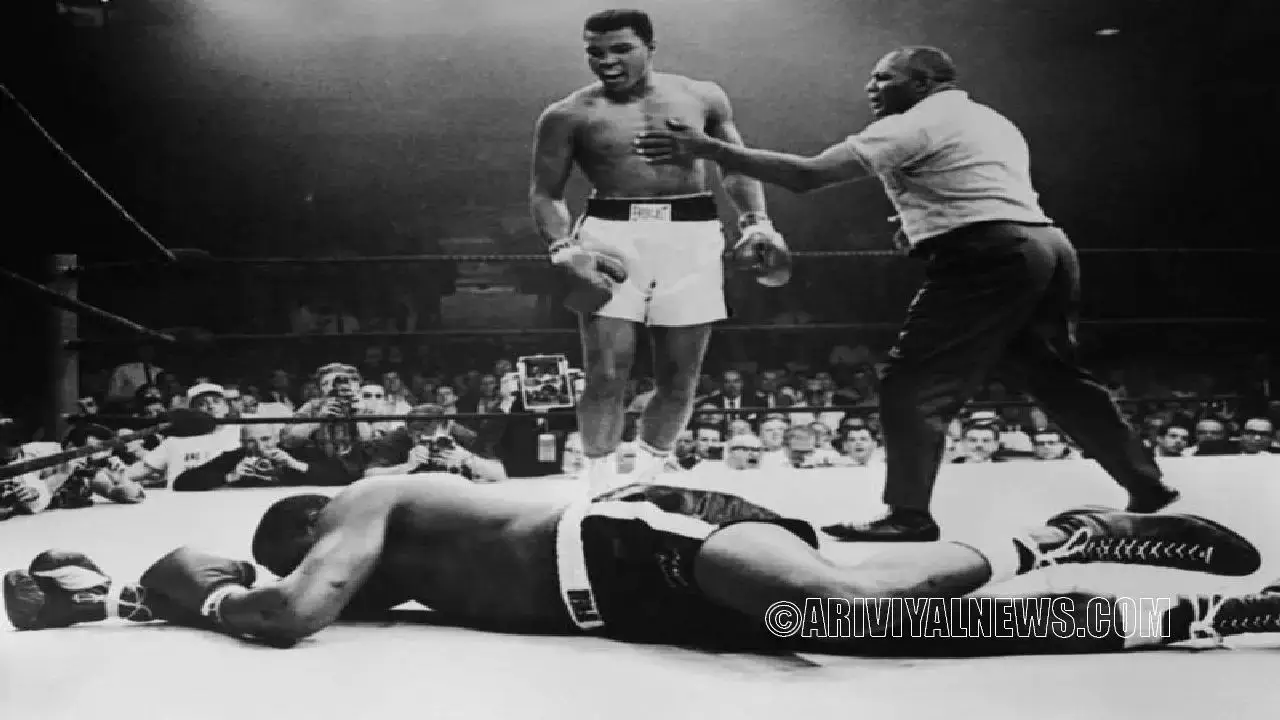
He was the one who spoke directly that our enemies were white and that they opposed us when we asked for liberation and equality. He is proud to be the most famous person in the world in the 1960s.
He is from the United States. His hometown is Louisville, Kentucky. He grew up in a rebellious state of mind, experiencing neglect at a young age and the persecution of people like himself. Today, many nations and athletes are desperate to win a single medal at the Olympics. Mohammad Ali threw the gold medal he got into the river.
Mohammed Ali gained worldwide star status in the 1960s for speaking out strongly against the Vietnam War. He said that the Vietnamese communists who fought against them valued equality more than the United States.
Mohammed Ali explodes not only inside the boxing arena but also outside. Fear will be born to the opponent if he stands on the field. One can understand why this is in his figures. Mohammed Ali has won 56 of the 61 matches he has clashed for the Heavyweight Championship. He was 18 when he won the gold medal at the 1960 Olympic Games in Rome. Because then his name was Cassius Clay.
The match against Sonny Liston in Miami on February 25, 1964 brought Mohammed Ali great fame. Liston was the then heavyweight champion. Who knocked out several champions in the first round. Many thought that Mohammad Ali could not be attacked in the face of his immense offensive ability.
But Mohammed Ali’s plan was precise. Mohammad Ali had said before the match that he could not attack with his hands if he could not see with his eyes. Mohammad Ali had lashed out at Liston in all of his interviews to popularize the fight. Someone had said they were going to die on the field. It was thought that Liston, angered by Mohammed Ali’s words, would soon overthrow him.
Mohammed Ali’s heart rate was 120 just before the start of the tournament in Miami. The audience and the judges thought that the heartbeat had doubled because of Mohammad Ali’s fear of seeing Liston. That may have been true. But the course of the fight was different.
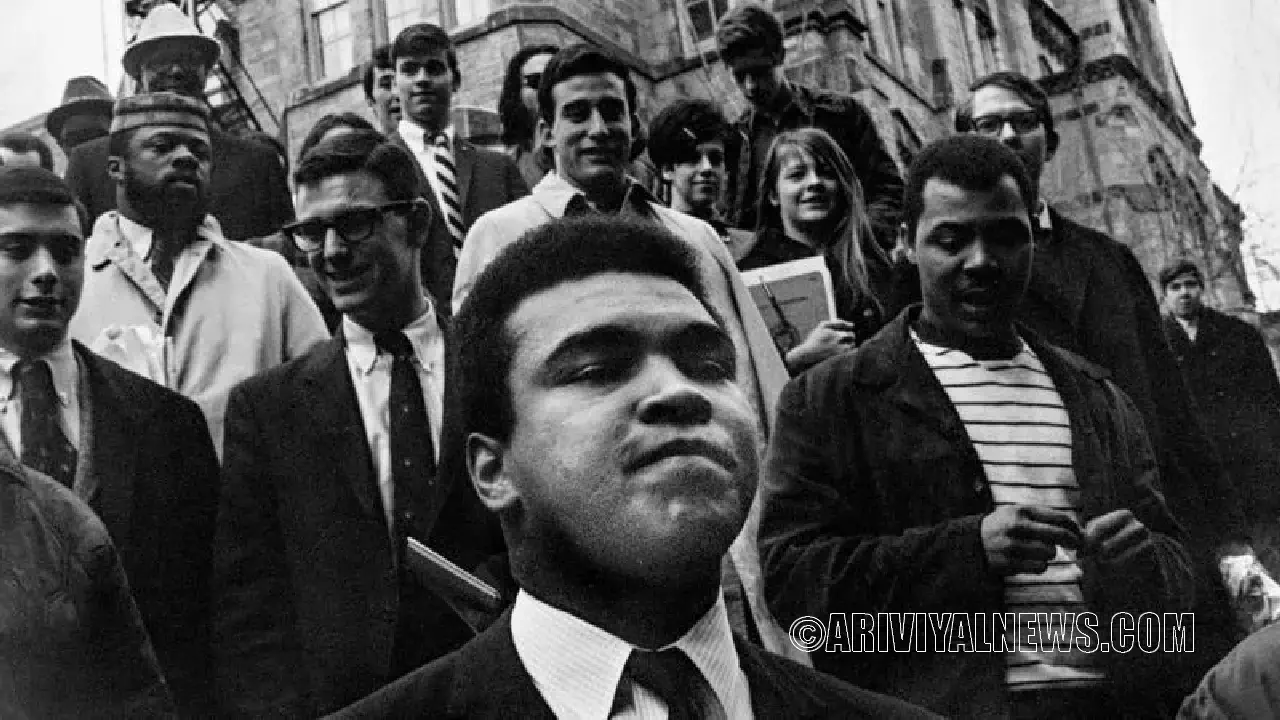
Mohammad Ali controlled Liston from the first round. In the third round, Mohamed’s stab wound bleed from near Liston’s left eye. For the first time in his boxing career, Liston saw blood dripping from his body. At the end of the seventh round, Mohammad Ali shocked the boxing world with his knockout victory. He was 22 years old at the time of the victory. It was only after this match that Cassius Clay changed his name to Mohammed Ali and converted to Islam. Famous black leader Malcolm X joined the Nation of Islam.
That was when the compulsory military service law was in force in the United States. Mohammed Ali rejected an order to join the army for the Vietnam War. Thus depriving him of the title of champion. Many states, including New York, banned Mohammed Ali.
The idea of being anti-national was spread. Passport disabled. He was fined and imprisoned for refusing military service. Mohammed Ali, however, escaped punishment on appeal. However, he was unable to compete for more than three years from 1967.
During this time, Mohammed Ali spent most of his time campaigning against the Vietnam War. Addressed on many platforms such as public spaces, colleges, youth organizations. Mohammed Ali’s comments gained value as the US military’s atrocities in Vietnam began to surface. Atlanta and New York then returned Mohammed Ali’s boxing license.
Mohammad Ali, who is often successful, also has failures. Mohammad Ali, who returned to the boxing field after the ban, clashed with then-heavyweight champion Joe Frazier. The match, which took place on March 8, 1971, was one of the biggest battles between Mohammed Ali.
Described as the Battle of the 20th Century, it was televised in 35 countries. Mohammad Ali fell, unable to withstand Frazier’s punches in the match. This is the first blow to Mohammad Ali, who has not been beaten by anyone in professional competitions. But then Mohammad Ali won the heavyweight title, beating Frazier twice.
Mohammed Ali did not follow any of the usual style of boxing. The one who devised some tactics for himself and fought to the end accordingly. Mohammed Ali’s notable skills include how to move his legs and how to move his hands at unexpected angles. Dexterous in maneuvering to deceive the enemy as if he had a face to attack. He has used this tactic to bring down many champions like Liston.
Mohammed Ali has beaten every heavyweight champion of his time. The time he fought on the field is said to be the golden age of heavyweight boxing history. Mohammed Ali, a close confidante of boxing legend Joe Lewis, is still known today as one of the few black and popular sportsmen.
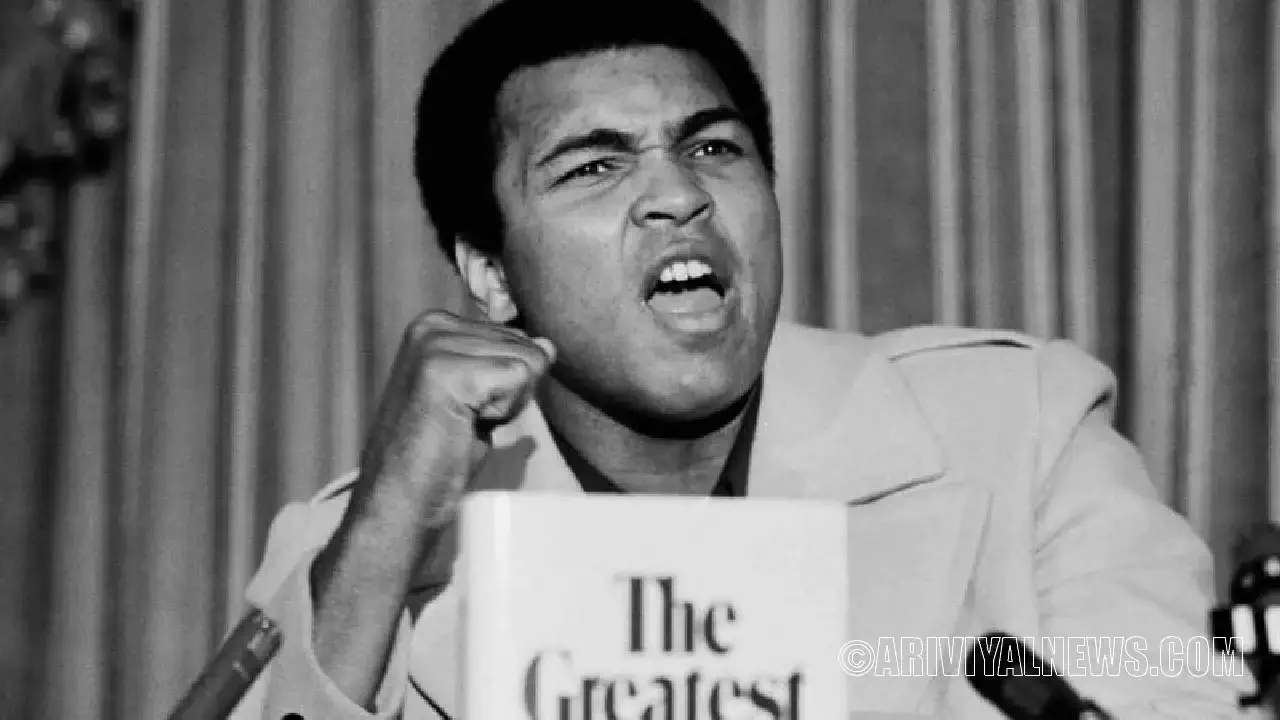
Mohammed Ali has been angry since a young age. That is what he did for the rest of his life. It was his anger at being robbed of his bicycle when he was 12 that drew him to the anal battlefield.
He then competed for the United States at the 1960 Rome Olympics in the sixth year. Many knew then that something was a boy. In the opening round, he stabbed the Belgian player in fear. He defeated the reigning Olympic champion in the next round. He finally defeated the strongest Polish player and won the gold medal.
It is said that he did not consider it a great honor. He returned to his hometown of Louisville in the United States after the tournament. He then went to a restaurant, where he got angry and fought because he was told that food would only be served to whites.
In his 1975 autobiography, Mohammed Ali stated that he threw the gold medal into the Ohio River in frustration and anger. “So there was no sadness or pain. Instead there was relief and new strength,” he said in his autobiography. Many do not accept this particular incident. They say the gold medal may have been lost. But the Olympic Committee did not take these stories seriously. In honor of Mohammed Ali, he was awarded the new gold medal at the 1996 Atlanta Olympics. Mohammed Ali, who was suffering from Parkinson’s disease at the time, said, “Thank you very much.”



